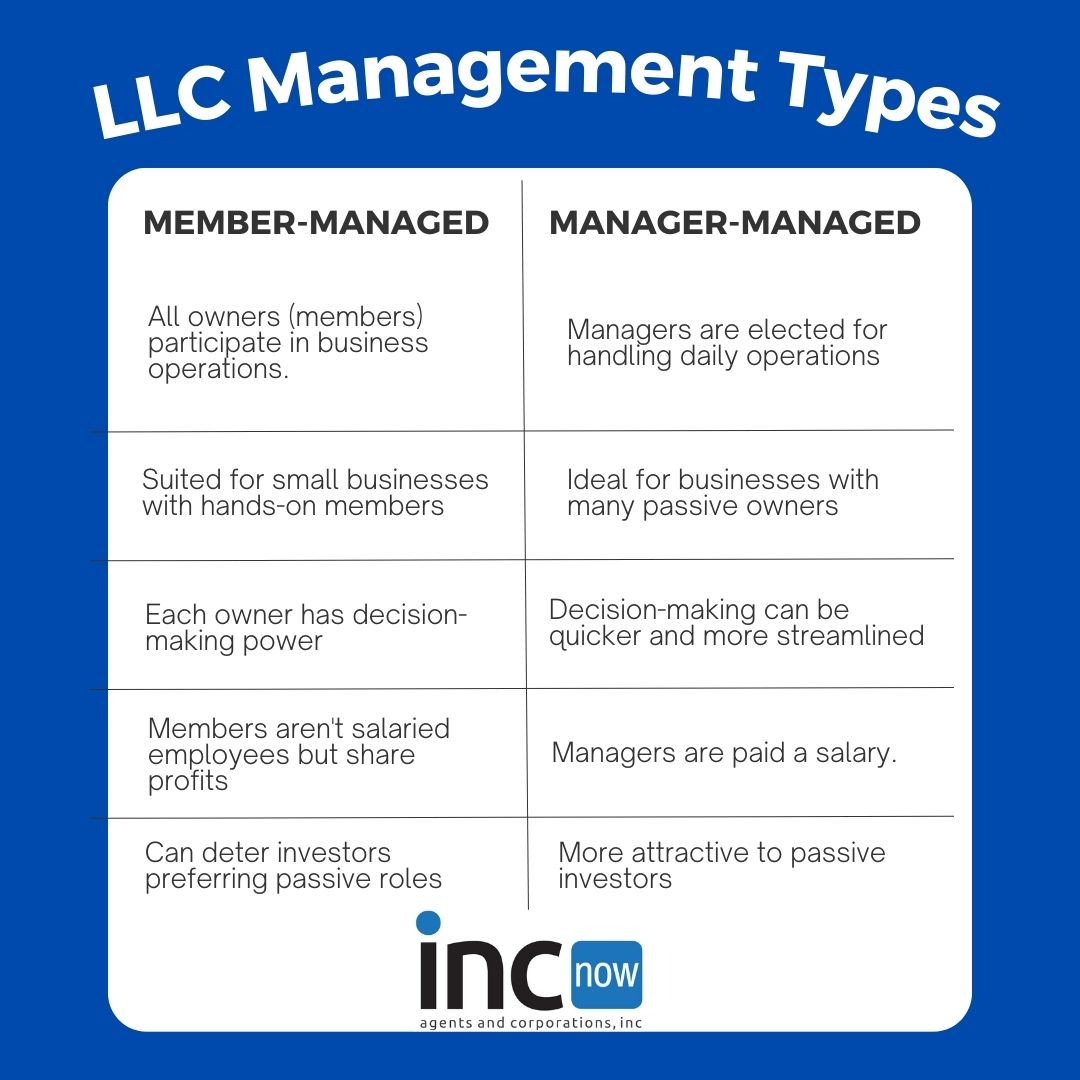How Are LLCs Managed? Member-Managed vs. Manager-Managed
Limited Liability Companies (LLCs) are a popular entity choice for business owners because they’re easy to manage. But did you know that even within LLCs, there are different management structures to consider? In this article, we dive deep into the two types of management structures for LLCs: Member-Managed LLCs and Manager-Managed LLCs.
What Is a Member-Managed LLC?
In a Member-Managed LLC, all of the Members are involved in running the business. So, the Members are both the owners and the Managers of the company.
In a Member-Managed LLC, each Member can:
- Sign contracts for the company;
- Hire employees; and,
- Make decisions about the company’s direction.
What Businesses Are Member-Managed LLCs?
Most small businesses are set up as Member-Managed LLCs. The owners of the company are also the Managers and oversee the daily business operations.
The most common example of Member-Managed LLCs are single-Member LLCs, which are owned and operated by just one person. In a single-Member LLC, the sole Member is also typically the manager of the company.
One thing to consider with a Member-Managed LLC is whether you are looking to attract investors. Oftentimes, outside investors want to be “passive” investors in the business and prefer not to get involved in daily operations.
What Is a Manager-Managed LLC?
In a Manager-Managed LLC, the Members appoint a Manager, or Managers, to help with day-to-day operations. The Members typically give Managers authority to act on behalf of the company. This includes being able to sign contracts on, open bank accounts and hire or fire employees for the company.
LLC Managers can also be Members, but they don’t have to be. A Manager-Managed LLC is similar to a traditional corporation where the board of directors makes decisions that are then carried out by the company’s senior officers.
What Businesses Are Manager-Managed LLCs?
Manager-Managed LLCs are often a good choice for companies with many owners. The elected Manager can make decisions quickly without waiting for approval from all the Members.
Additionally, Manager-Managed LLCs are often used by businesses that want to bring on investors as Members. Investors can be passive owners of the LLC while not having any responsibilities related to running the business.
Who Are LLC Members?
The owners of an LLC are called “Members”. This differs from corporations, which call their owners “shareholders” or “stockholders”.
LLCs list the names of their Members and each Member’s ownership share in the company’s Operating Agreement. An LLC Operating Agreement is the contract between each owner that establishes what each of their ownership percentage and how the company is managed.
Most states do not put restrictions on who can be an LLC Member. So, LLC Members can be individuals, corporations, or other LLCs. Foreign entities can also be LLC Members and have ownership in a U.S. LLCs.
Who Are LLC Managers?
LLC Managers have the authority to act on behalf of an LLC, however, they do not necessarily need to be owners of the business. The LLC Members who own the company appoint LLC Managers often to run the day to day operations of the business.
An LLC Manager may be authorized to sign contracts on behalf of the company and its Members, open bank accounts for the LLC, and hire or fire employees.
Same as with LLC Members, LLC Managers can either be individuals or other companies. So, an LLC can be the Manager of another LLC.
An LLC’s Managers are named in the company’s Operating Agreement. The LLC Operating Agreement also details the specific title and role that a Manager has in the LLC. For example, most LLCs appoint a President, Treasurer, and a Secretary.
Member-Managed LLC vs. Manager-Managed LLC: Pros and Cons
Member-Managed LLCs and Manager-Managed LLC both have some pros and cons. Let’s take a look at some of them.
In a Member-Managed LLC, all Members have a say in decisions. This can be great for small businesses where everyone wants to be involved. Member-Managed LLCs are generally less complicated and can be easier for some businesses to manage. However, management responsibilities can be time-consuming for the Members and might deter investors who prefer not to deal with a business’s daily operations.
A Manager-Managed LLC can allow for quicker decisions and is ideal for businesses with many owners or passive investors. The downside in a Manager-Managed LLC is that not all owners get to participate in daily decision-making. Plus, if you hire a professional manager, you’ll need to pay them a salary, which could be a challenge for smaller businesses.
How To Choose: Member-Managed LLC vs. Manager-Managed LLC
How do you decide whether a Member-Managed LLC or Manager-Managed LLC is right for your business? Well, it really depends on your situation.
If your business has many Members or investors who prefer a more passive role, a Manager-Managed LLC might be the better choice. This structure can streamline decision-making and help the business operate more smoothly.
For example, imagine an e-commerce company where two founders have found a couple of interested investors. These investors only want to invest their money; they do not want to have any responsibilities in the business. In this case, the company might choose to be a Manager-Managed LLC, allowing the founders to run the business while the investors stay in the background.
On the other hand, a Member-Managed LLC might be a better fit if you have a small business where all of the Members want to be involved in the daily operations. Remember, the main idea is to choose a structure that best suits your business needs and preferences.
How To Pay LLC Members and Managers
The roles and compensation within an LLC can depend on the management structure. In a Member-Managed LLC, the Members are owners and share the profits of the business. LLC Members are not considered employees, and therefore, do not receive a salary. Instead, they get paid through distributions made from the company’s profits.
In a Manager-Managed LLC, the managers might be professional managers who are not owners in the LLC. Professional managers are considered employees and receive a salary for their work. This means that if you hire a professional manager, you’ll need to account for their salary in your budget.
INCNOW: HOW TO MANAGE LLC CAPITAL CONTRIBUTIONS AND DISTRIBUTIONS
How To Change LLC Management
One of the primary benefits of forming an LLC is that they are flexible. If you start an LLC with one management structure and find that it’s not working for you, you can change it later. All it takes is some updates to the company’s LLC Operating Agreement and the consent of the Members.
Any changes to an LLC’s management structure should be done carefully and, ideally, with the help of a professional. For example, IncNow can help prepare an Amended and Restated Operating Agreement for a Delaware LLC.
Choosing a management structure for your LLC is an important decision. It affects how your business will operate and how decisions will be made. Both Member-Managed and Manager-Managed LLCs have their advantages, and the best choice depends on your business’s unique needs and circumstances.
If you’re a hands-on owner who wants to be involved in daily operations, consider a Member-Managed LLC. If you prefer to delegate daily operations to a professional manager or if you have many owners or investors, a Manager-Managed LLC might be a better choice.
Remember, there’s no one-size-fits-all answer, and it’s okay to change your mind later as your business grows and evolves.






